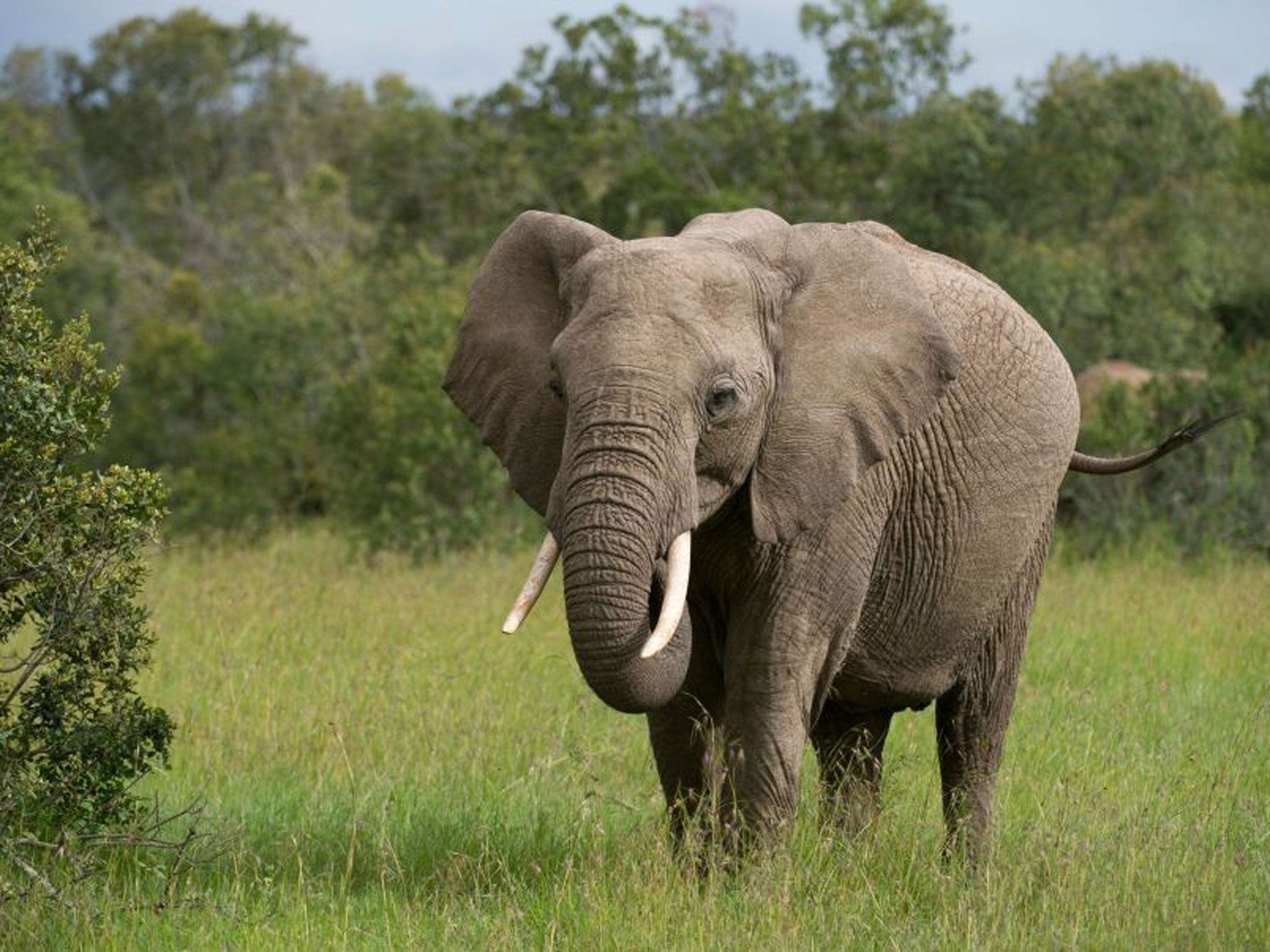Poachers no longer in control of ‘Wild West’
Funds from The Independent’s charity appeal are already making a big difference in Kenya. Evgeny Lebedev reports from West Laikipia


The potential recruits had come from across West Laikipia. Word had gone out that only the best of the best were needed but that had not deterred dozens putting themselves forward for the chance to join the fight for East Africa’s elephants.
Even before the final three-day selection stage, when those in contention were put through their paces, a rigorous process had been undergone to weed out any who lacked the required physical or mental stamina.
Local leaders were asked who they would recommend for the job. Enquiries were made to ensure none had even the vaguest link to the poaching gangs who seek to devastate this region’s wildlife.
That left 19 to choose from. From them two units of six would be selected to be put on the front line in the conflict now raging across much of Africa: a battle between those seeking to save the continent’s elephants and those who hunt them to feed Asia’s seemingly insatiable appetite for ivory.
Simon Eturen, 40, was one of them. He had put himself forward, he told me, as, living locally, he had seen for himself the number of animals killed – and witnessed first-hand the instability poaching gangs caused as they stole from local people and killed precious cattle while conducting their ivory hunting.
“Thieves and bandits go into the local communities,” he explained, “and if the poaching goes on at the present rate then we will lose the wildlife. There have been many, many carcasses.”
I knew for myself this was true. Earlier I had visited one of the latest elephant fatalities in Kenya. Accompanied by armed members of the Kenya Wildlife Service, we drove for over an hour across the bush to where the remains lay, the now stripped-bare bones glinting in the sunlight.
An inspection of the teeth made clear that it was not old age that had killed this animal. It was too young and healthy for that. The reality was that its end may well have come at the hands of man, shot – but not immediately fatally. So it had stumbled through the undergrowth before finally discovering a quiet spot in which to die.
Its temporary escape meant that the ivory remained untouched, the long tusks poking out of the bone of its skull. The wildlife rangers removed them carefully, both the tusks slipping out of the cavity which held them. This released a concoction of foul-smelling liquids and the nerve that had helped hold them to the animal, the tissue flopping to the ground where it lay like a giant tongue.
The rangers were there to ensure the ivory did not fall into the wrong hands. So sensitive is the issue of poaching and ivory in East Africa that I cannot even say in print where the carcass was located.
All I can confirm is that each tusk was carefully wrapped up and ferried away on a truck to a government strong room, where it will be held behind lock and key to prevent it getting on to the black market.
I had gone to Kenya to see the recruitment of extra rangers. The two units undergoing selection in West Laikipia are among the first initiatives being implemented to protect Africa’s wildlife as a result of the generosity of Independent readers in giving to our Christmas campaign.
Space for Giants, the Kenya-based conservation charity we have championed, is at the forefront of this anti-poaching fight. It was its success in introducing rapid-response teams to combat incursions by poaching gangs that saw the number of elephants killed drop by 65 per cent in the regions under its protection.
The money now raised means this protected region is being extended into West Laikipia. No funds had previously been available to take this crucial step until the donations started pouring in from you, in what has been the most successful appeal in The Independent’s history.
Max Graham, founder of Space for Giants, was ebullient about what would now be possible, and the number of animals that could be saved. “At the moment this is the Wild West,” he told me. “If you look at the distribution of carcasses this spot [West Laikipia] is the hole. The poachers have been acting with impunity here for the last three years. These new teams will make all the difference – and quickly.”
The extension of the ranger programme – all its members being Kenyan police reservists who work hand in hand with government and wildlife authorities – is only part of the way the money raised will help Africa’s elephants.
Funds are going on community programmes to educate people in surrounding towns and villages. Elephants are being fitted with GPS collars so warnings can be given when they are at risk of straying into poaching hotspots. A new conservancy is being developed which will create a new safe space for hundreds of elephants to roam.
But with criminal gangs desperately seeking to cash in on the money to be made from ivory, in parts of Asia it commands a price per gram greater than that of gold – boots on the ground is the most urgent step.
I witnessed exactly what work these recruits would do once selection and training is completed. Travelling into the Northern Kenyan Rangelands I spent time with units just like the ones being put together: lean six-man teams who spend weeks at a time in the bush tracking poachers.
These teams, like those that will soon be in West Laikipia, had been given codenames – in their case 9-1 and 9-2. All had been kitted out to the very highest standard. As well as the latest rifles with which to protect themselves – in most cases German G3s – they also had top-of-the-range radios and medical equipment. These were needed because, I learnt, a confrontation with a poaching gang can easily escalate into a firefight.
Each wildlife protection unit was also made up of a mix of local tribes to ensure all communities were represented and no single group dominated. This, I discovered, helped build trust with the surrounding area – and also opened up the avenues through which intelligence could be gathered.
Talking with the poacher hunters as they briefly rested in the shade of a tree, they described how the gangs are becoming better armed and more audacious. Where only recently elephants were being killed by bows and arrows now it is by AK-47s. Like those seeking selection, however, they were sanguine about the potential dangers. “If it is dangerous, then let it be dangerous,” I was told. “This is important work to do.”
Training the latest additions to this effort is a former SAS sergeant major who only recently left the regiment after 27 years of service, much of the last decade of which was spent in Iraq and Afghanistan. He has no illusion about the scale of the task faced.
“At present it’s no-man’s-land here,” he said. “The police don’t patrol it. The wildlife services don’t come.” It is why he needs the manpower. “That,” he emphasised, “is what will win this.”
The three-day selection boot camp began with an eight-mile run. Then there were sessions of battle PE in which short running bursts were interspersed with ruinous sessions of press-ups. There had been first aid instruction and tests; weapons familiarity; exercises to examine each candidate’s ability to work as a team. The last hurdle, however, was the log race.
Divided into three teams, the recruits were required to lug the log down and then up a valley. Some were praying as their instructor waited to issue the order to go. When given, they disappeared down the hill in a cloud of red dust. At the end they collapsed to the ground, their bodies drenched in sweat and the logs now dumped unceremoniously beside them.
Their assessor, the former SAS soldier, eyed them with pride. “Every one of them busted a gut,” he said approvingly. “They’re keen as hell. The right training, the right equipment: they’ll solve the problem here.”
Evgeny Lebedev is the owner of The Independent titles and London Evening Standard.

Join our commenting forum
Join thought-provoking conversations, follow other Independent readers and see their replies